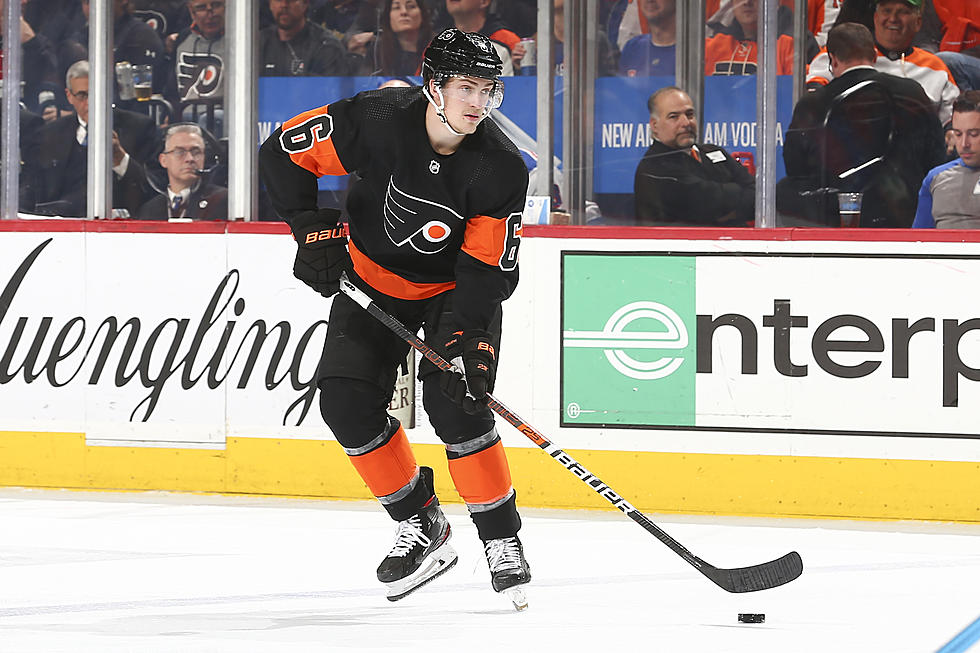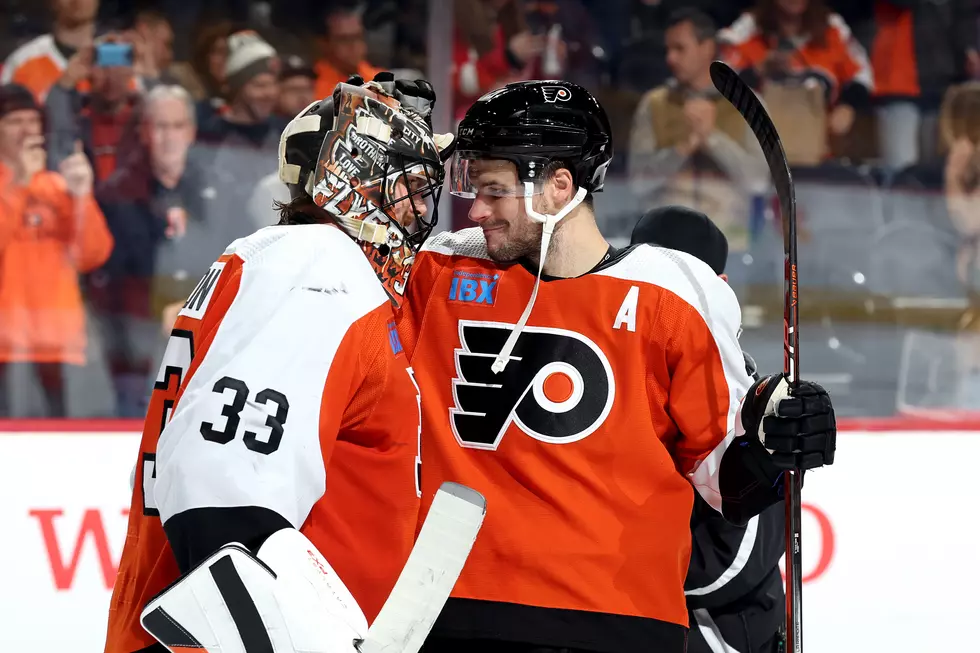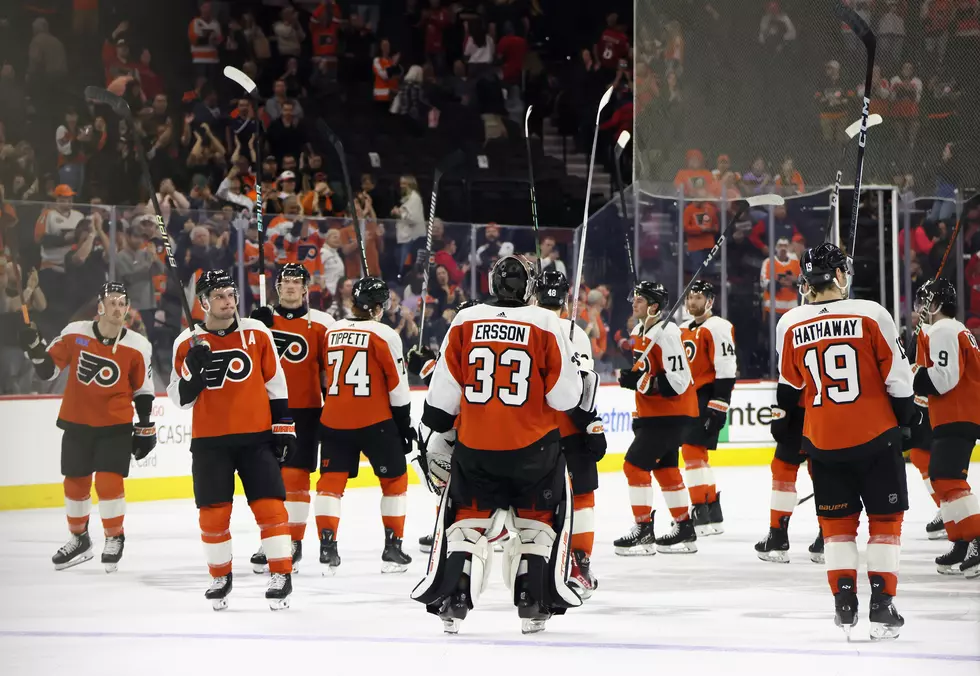
Flyers 5: Takeaways from Saturday’s Flyers-Panthers Game
As the early part of the NHL season schedule evolves, the Flyers were really handed a brutal beginning in terms of early tests. Their second game of the season was against the NHL’s newest team, one that there really wasn’t any film on as a collective unit except a small handful of games. Then they faced a team they were very familiar with, one that had their number last season in the Boston Bruins.
Saturday’s game against the Florida Panthers, to the casual hockey fan, may have seemed like a game the Flyers would typically win. But these aren’t the Florida Panthers of the last decade. This is a very talented team, one that many believe is in Stanley Cup contention territory.
For two periods, the Flyers not only hung around, but actually led for a decent amount. One costly mistake allowed Florida to tie it up before the second ended, but that allowed for another final-period push for the Flyers to come away victorious. The opportunity presented itself, and ultimately went the wrong direction with a momentum-swinging goal.
The Flyers ended their four-game homestand to start the season with a 2-1-1 record after Saturday’s 4-2 loss to the Panthers, showing signs of promise with their level of compete, but also falling short in a couple of games that were certainly there for the taking.
Here at five takeaways from Saturday’s loss.
1. Penalty Kill Impresses
If there was an area that was certainly impressive, it was the penalty kill. The Panthers were 1-for-7 on the power play, and while they did strike in the first period, the Flyers penalty kill had to stand tall to keep them in the game.
While we’ll get into the reasons why the Flyers were shorthanded so often, it was an area that really hadn’t been tested much to this point in the season. They were 2-for-4 against Vancouver in the season opener, but had gone 4-for-4 against Seattle and killed off the only power play for Boston in Wednesday’s game. So to nearly double that in one game is not ideal.
That said, the Flyers PK was certainly aggressive quite a bit. In one instance, it turned into a shorthanded goal for Cam Atkinson, who continues to make his presence felt early in the season. A turnover at the blue line allowed Atkinson to go in untouched on the breakaway and score through the five-hole of Sergei Bobrovsky.
Despite the one goal allowed with Florida on the man-advantage, the Flyers did show signs that their PK in trending in the right direction. That comes just in time for their next big test.
2. Hart Remains Sharp
A key part of your penalty kill is often your goaltender. The Flyers did a pretty solid job of preventing shots from reaching Carter Hart on the PK during the game, but Hart had another solid showing.
There wasn’t really much Hart could have done on any of the three goals he allowed in the game. Jonathan Huberdeau’s first was a high shot from the left circle. Owen Tippett scored on a tip-in off his skate with Hart going cross-crease on the attempt. On Huberdeau’s second while shorthanded, Hart actually came up with a huge save on a breakaway before Huberdeau was able to bank it in off Hart.
Otherwise, Hart made 27 saves, good for a .900 save percentage. That’s roughly average at best by the numbers, but Hart certainly kept the team in the game throughout, especially against a team that was averaging 4.5 goals per game this season. They only reached four in this game thanks to an empty-netter at the end.
3. Costly Mistakes
Back to Florida’s final two goals with Hart in goal. Two mistakes that involved multiple players proved to be costly.
Let’s start with Tippett’s tying goal late in the second period. For one, timing is everything. The Flyers had played a strong second period to take the lead on a red-hot Florida team. They were under a minute away from taking that lead into the third period.
That’s when the Flyers top line turned the puck over carelessly. Travis Konecny makes a pass through the middle of the offensive zone with all three forwards deep, allowing the Panthers to counter with numbers. The Flyers actually do a good job on the backcheck, so much so that the Panthers really didn’t have much of a play.
MacKenzie Weegar has the puck along the left wing on his backhand. The only player with even a possible path to the net was Tippett, and by this point, both Rasmus Ristolainen and Travis Sanheim are back. Ristolainen does a decent job of at least taking away the angle for Weegar, leaving him with either a backhander straight at Hart or a cross-crease pass. Weegar attempts the pass, and it flutters right through Sanheim and gets to Tippett’s skate, deflecting up and over Hart as he sprawls across. Sanheim isn’t even positioned poorly here, it just somehow gets through when it absolutely should not.
Now to the shorthanded goal that ultimately proved to be the game-winner. At this point, the Flyers really have a lot of momentum. They killed off the remaining 1:45 of a penalty to Ivan Provorov taken 11 seconds after Tippett’s goal and killed off another penalty less than five minutes later. Now, just shy of seven minutes into the period, they were on the man-advantage themselves.
Keith Yandle makes a pass back toward the blue line, but missed his mark. It’s actually unclear who the intended target is, as it drifts between Claude Giroux at the top of the point and Sean Couturier along the right circle. This allows Sam Bennett to jump up and take control. Giroux is the lone man back as Huberdeau joins the rush, so Bennett draws Giroux in and makes the pass to Huberdeau, now in on a breakaway. He cuts to the backhand and puts it on net, but Hart extends the left leg and makes the save. The puck follows Huberdeau behind the net, and the Flyers, now a minute into the power play, have tired players on the ice and are not able to get back to disrupt a follow-up attempt from Huberdeau. He banked the shot in off Harts pad, giving Florida the lead again.
Mistakes can certainly be the difference in a game, but they are also magnified especially against a team with that much talent.
4. Lack of Discipline
One of the big issues the Flyers had in this game was all of the time spent shorthanded. The Flyers took seven penalties in the game, which not only provides a number of opportunities for the opposition, but also disrupts the flow of your offensive pursuit and the ability to roll lines as you intend.
One power play lasted five seconds before Huberdeau scored. Another lasted 1:25 before the Panthers took a penalty.
It’s not just the number of penalties taken, it’s how obvious many of them were. Travis Sanheim’s interference penalty in the first was a blatant foul. Nick Seeler took a similar penalty moments later, though one that was more debatable given the circumstances.
Ivan Provorov’s tripping penalty late in the second after Tippett’s goal was another obvious call. Nicolas Aube-Kubel took another needless tripping penalty in the third, right after making a positive offensive play to generate a scoring chance.
After Florida regained the lead, Nate Thompson took another penalty with 9:46 to play that was also unnecessary. Thompson’s intention to clear the porch and protect his goalie is admirable, but after getting one shot in on Patric Hornqvist, Thompson added two more shots to take the penalty. It’s a spot in the game where you can’t put your team down a man, no matter what your intentions may be.
Perhaps the Flyers were a little lucky to only allow a goal on seven power-play attempts for Florida. It’s certainly a key to their victory over Boston that they only took one penalty during the game and will be a key to their game next Wednesday against Edmonton’s lethal unit.
5. Staying with the Pace
Speaking of Edmonton coming up on the schedule, that’s another test against an undefeated team early in the season. Give the Flyers credit for making it an interesting game. Florida has a lot of potential, and this was certainly a big test. Did the Flyers completely pass it? No, they didn’t come away with the result in a game that was there for the taking.
But certainly for parts of the game, the Flyers looked like they were in control. The Flyers showed they can hang with Boston earlier in the week and that they can keep up with Florida on this night. They also did that without Ryan Ellis in the lineup.
It’s certainly a results-based business, so winning is what matters. But perhaps the silver lining here is that the Flyers have faced some early tests and played in competitive games throughout. Perhaps the silver lining is also that there appears to be a lack of satisfaction in simply competing in games.
“We did a lot of good things. You win this game and it’s a great homestand. You lose this one and it just becomes an okay stand,” Giroux said. “We’re four games into the season. We’ve just got to keep working on our game. We’re not going to win all the games. I think it’s important that when we lose one, the next game we answer.”
Kevin Durso is Flyers insider for 97.3 ESPN and Flyers editor for SportsTalkPhilly.com. Follow him on Twitter @Kevin_Durso.
Philadelphia Flyers Uniforms Through The Years
More From 97.3 ESPN









